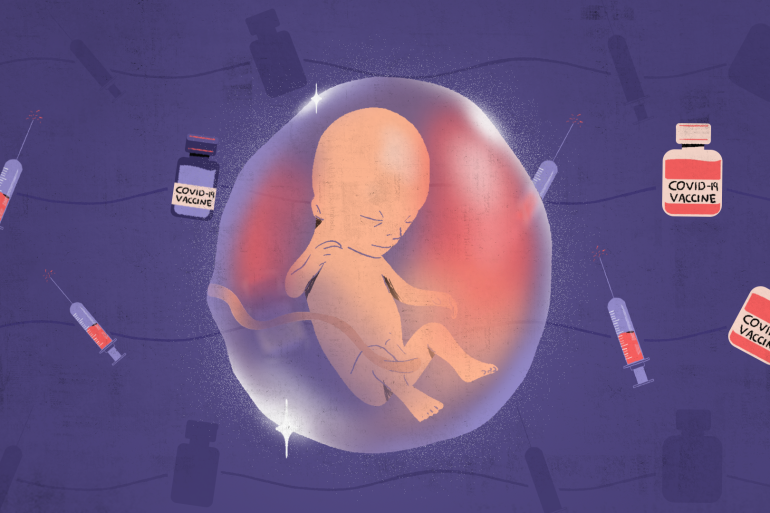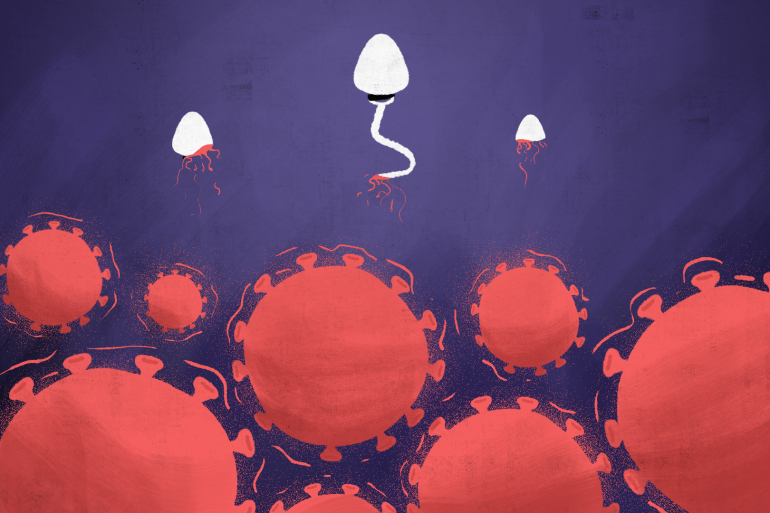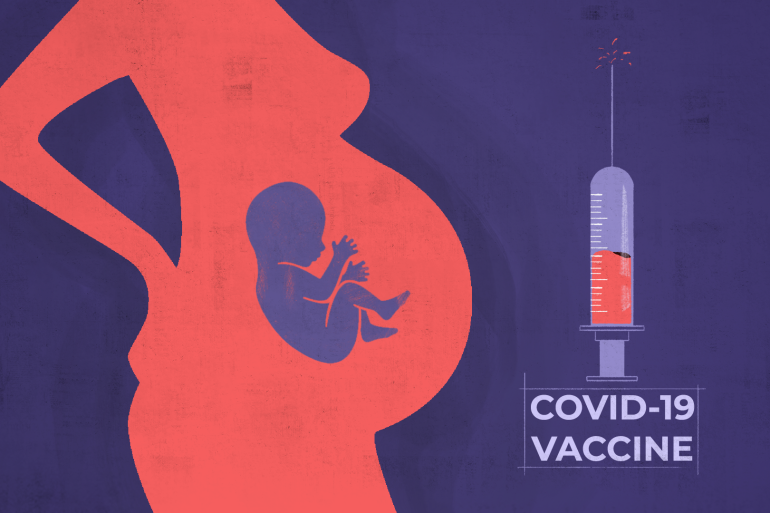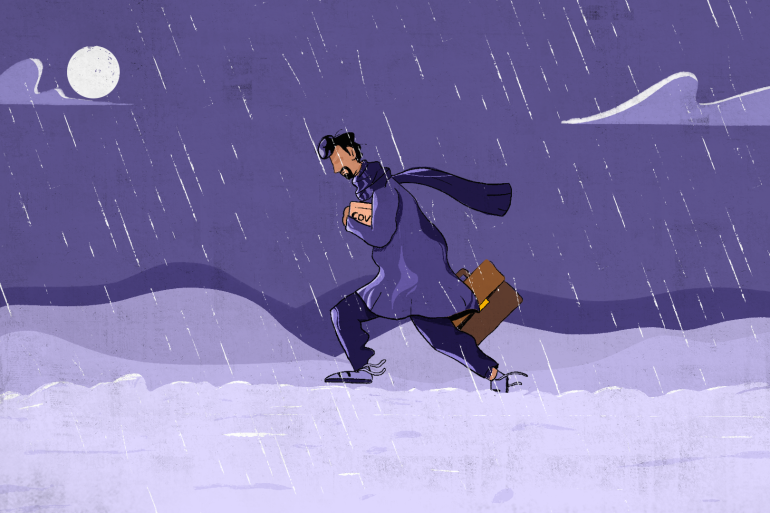Is it safe for pregnant women to have a COVID-19 vaccine?
This is how the coronavirus, and the new vaccines, may affect pregnancy, breastfeeding, sperm counts and fertility.

Last week, my sister who is an NHS dentist, told me she was going to get her first dose of the COVID-19 vaccine. While we spoke on the phone, she said she was a little apprehensive about getting it. When I asked her why she said two of the dental nurses at her surgery were not getting theirs as they both saw messages on WhatsApp that said the vaccine would make them infertile. I told my sister it was complete nonsense and that there was no evidence to suggest this was true; she subsequently went to get vaccinated, but the nurses did not.
Sadly, I am hearing from many young people who are hesitant to take the COVID vaccine due to misinformation they have come across around fertility – so let me address this issue head-on.
Keep reading
list of 4 itemsUK defends AstraZeneca vaccine after South Africa halts roll-out
WHO vaccine experts recommend use of Oxford-AstraZeneca jab
Stillbirths: An overlooked consequence of the COVID-19 pandemic
Despite a whirlwind of social media posts, there is no current evidence that any of the COVID-19 vaccines affect fertility in either females or males.
On December 16, 2020, the American Society for Reproductive Medicine (ASRM) put out a statement (pdf) that said: “Patients undergoing fertility treatment and pregnant patients should be encouraged to receive vaccination based on eligibility criteria. Since the vaccine is not a live virus, there is no reason to delay pregnancy attempts because of vaccination administration or to defer treatment until the second dose has been administered.”
In the United Kingdom last month, the Royal College of Obstetricians and Gynaecologists (RCOG) put out a joint statement with the Royal College of Midwives stating: “There is no biologically plausible mechanism by which current vaccines would cause any impact on women’s fertility. Evidence has not been presented that women who have been vaccinated have gone on to have fertility problems.”
In fact, during the Pfizer study looking at the effectiveness of the vaccine, 23 of the participants became pregnant during the trial period. Only one of these women went on to have a miscarriage and she was in the placebo group, meaning she did not receive the Pfizer vaccine at all.

While there is no evidence of the vaccines causing infertility in women, there is growing concern that the coronavirus infection itself could affect the health of the testicles in men. A study which looked at post-mortem findings of males who had died from COVID-19 showed the virus had caused inflammation in the testicles and even affected sperm production, resulting in less sperm. This is not unique to SARS-CoV-2, as other viruses such as mumps, hepatitis, and Epstein-Barr Virus (EBV) can cause pain, swelling and inflammation of the testicles. All the more reason to get the vaccine when offered, in my opinion.
Pregnant women and COVID-19
The advice for women who are already pregnant is slightly more nuanced and there is some variety in approach depending on which country you are in. All experts agree there is no evidence to suggest that any of the COVID-19 vaccines are likely to have adverse effects for either mum or baby; however, some organisations are being more cautious than others.
It is important to state here that there is evidence showing that pregnant women who contract the COVID-19 virus are at increased risk of poor outcomes – including needing ICU admission and invasive ventilation and facing a higher risk of death when compared with their non-pregnant counterparts. There is even a small body of evidence that says contracting the COVID-19 virus during pregnancy may increase a pregnant woman’s risk of preterm birth when compared with pregnant women who did not contract the virus.
In order to help protect them from these risks, it is important that pregnant women receive safe and reliable advice when it comes to getting the COVID-19 vaccines.
The World Health Organization (WHO) has recently updated its advice around pregnant women receiving the vaccine, stating only those who are at high risk of contracting COVID-19 through work, or who have underlying health conditions which predispose them to develop complications from the virus, should take the vaccine.
The RCOG in the UK have taken a similar stance, stating that although the available data does not indicate any safety concern or harm to pregnancy, there is insufficient evidence to recommend routine use of COVID-19 vaccines during pregnancy, and have reserved the vaccines for pregnant women who are at risk of exposure through work or who have underlying health conditions.
In the US, the Centre for Disease Control and Prevention (CDC) has taken a wider approach saying the vaccines are safe in pregnancy and pregnant women can choose to have them, but should first consult with their doctors to be sure.

The slight difference in advice is not based on evidence, but the lack of it. Despite calls for pregnant women to be included in trials, they were not. This is in keeping with traditional methods of conducting trials, although this approach is now being disputed. Taking vaccines is commonplace during pregnancy: Flu and rubella vaccines are routinely offered to pregnant women. There is no data or even theoretical risk to suggest these vaccines would be harmful to pregnant women. Some organisations may be erring on the side of caution, but with adverse outcomes from contracting coronavirus higher in pregnant women, it would be sensible to take a uniform approach to prevent confusion.
Thankfully, the advice for breastfeeding women and the vaccine is clearer. The UK’s Medicines and Healthcare Products Regulatory Agency (MHRA) now states that pregnant and breastfeeding women can receive the COVID-19 vaccine. The CDC has said there are no safety concerns when it comes to the COVID vaccines and breastfeeding. This news has been welcomed by breastfeeding women who can now safely take the vaccines.
Reviewing the available data, it does appear the COVID vaccines are safe to take when pregnant, thinking about a future pregnancy, or breastfeeding; and it is important that expert advice is adhered to rather than wild social media claims.
The Follow-Up
As South Africa pauses roll-out of the Oxford-AstraZeneca vaccine, what does it mean for other countries?
There has been much made of the recent news that the roll-out of the Oxford-AstraZeneca vaccine was paused in South Africa after a relatively small study comprising 2,000 young volunteers suggested the vaccine did not prevent mild to moderate disease when it came to the variant discovered in South Africa, dubbed 501Y.V2. According to the study, not yet formally published but seen by the Financial Times, the Oxford-AstraZeneca vaccine offers as little as 10 percent protection against this variant.
The South African variant includes the N501Y mutation identified in the UK variant, which makes the virus more infectious. But it also includes another mutation, known as E484K.
The vaccines approved so far trigger an immune response that relies on recognising parts of the coronavirus spike protein, which allows the virus to latch on and enter human cells. The E484K mutation, however, changes the shape of the spike protein in a way that makes it less recognisable to the body’s immune system. This change in shape has raised concerns over the Oxford-AstraZeneca vaccine’s ability to combat it.
With South Africa pausing its roll-out, questions were asked about the UK’s roll-out of the same vaccine. After much debate, the definitive answer came from England’s deputy chief medical officer, Professor Jonathan Van-Tam, who said at a Downing Street conference that case numbers for the South African variant in the UK were still “very small” and it was not likely to become the dominant strain.
The strains that are most widespread in the UK are the original strain of the virus and the Kent variant, and the Oxford-AstraZeneca vaccine is effective enough against these.
He went on to say: “I don’t think that this is something we should be concerned about right at this point in time.” He urged people to take up whatever vaccine they were offered and that, if needed, booster vaccines would be available later in the year if other strains became more widespread.
As a doctor, I couldn’t agree more; we have to protect our populations against the imminent threat. In the UK and many other countries, it is the original and Kent variants that are making people sick right now and pushing hospital numbers up. So please, take up the vaccine you are offered.

In the Doctor’s Surgery
Vaccinating care homes in a blizzard
During the first wave of the pandemic, our care homes in the UK were hit hard. These house our most vulnerable people; they are often frail and have other illnesses, so when they get hit by the coronavirus, they suffer. It was no different in the care homes I look after. I saw patients I had looked after for years, patients who I knew well, sadly succumb to COVID-19. To add to the misery, there was only limited access for relatives to see them during their illness. It was heartbreaking.
When the news of the vaccines came out, there was a tiny ray of light in what was otherwise a very long and dark tunnel. Care home residents were to be vaccinated as a priority, they were at the top of the list when it came to vulnerable groups. But care home residents cannot come to us for their vaccines, we have to go to them.
The first vaccine to be approved in the UK was the Pfizer vaccine. It had limited travel ability due to the incredibly low temperatures it had to be kept at, meaning we were unable to get these out to care homes. Instead, care home residents had to watch as people in lower priority groups who could come to the surgery were vaccinated.
Thankfully, it wasn’t long before the Oxford-AstraZeneca vaccine was approved for use. It was much more portable so as soon as we had our first delivery we were able to get it out to care homes. I volunteered to take a lead role in vaccinating our care home residents. I planned to come in on my days off and vaccinate one home at a time; it was a matter of urgency.
The day I was due to give out the first doses, it snowed. Not just a dusting of snow, but thick blizzard-like snow. What is normally a 30-minute drive to the surgery took me two hours. When I got there, the snow was coming down harder. I went to the fridge where the vaccinations were being stored and counted out 50 doses, this was how many people I had to vaccinate that day. I placed the vaccines in a cool bag that was designed to keep the temperature between 2-8 degrees Celsius (35.6-46.4 degrees Fahrenheit). I decided driving to the home would be futile, the traffic was now at a standstill. Walking was my only option. It was a mile (1.6km) to the home, and by the time I got there I was cold and my shoes were soaked through, but it didn’t matter, these patients needed these vaccines.
When people think of residents in care homes they often think about older people wearing cardigans and handing out boiled sweets to visitors. This is true for many homes, but the one I was visiting specifically catered for older people with advanced dementia. They did not know why they needed to be vaccinated (their family members had consented for them).
I knew it was going to be a challenge, but I also knew that these people needed the vaccines in order to be able to see their relatives in the future on a regular basis – something that is desperately important for those living with dementia.
I have to admit, I got hit and sworn at a few times by patients as I vaccinated them, but the vast majority were lovely and one even pinched my bottom!
By the end of it, I was exhausted but I had a renewed sense of purpose. I felt I was doing something hugely important and worthwhile. As I walked back in the snow, I was already looking forward to vaccinating my next care home.
Some Good News
The 10-year-old spreading positive pandemic stories
It can all feel doom and gloom when it comes to news stories about the coronavirus, but Aryaman Sinha, a 10-year-old boy, has set up a website that spreads the good news about COVID. Whether it is the roll-out of vaccines in developing countries, how writers are inspiring budding authors to write about their pandemic experiences, or how healthcare workers in the US were treated to a surprise Super Bowl trip, it is all on his website: goodnewzcoronavirus.com
Aryaman does not make any money from his website, and his aim is to make people feel happy in an otherwise dark time. His motto is: “Spreading good news, not the virus.” The website is updated regularly and is well worth a visit if you want to read something that gives you that warm glow inside, something we can all do with right now!
Reader’s Question:
Some of my friends have felt awful after getting their vaccines; are side effects common and should I get vaccinated?
Some mild symptoms after any vaccine are common, and it is no different with the coronavirus vaccines. People have reported headaches, fevers, chills and feeling groggy after taking the vaccine. For the vast majority of people, these effects will last one to two days, for other people it may be up to a week. This is normal and is your immune system responding to something “foreign” in your body; antibodies will be being made during this time. Do not let this put you off getting the vaccine, because if you were to get sick from COVID-19 itself, it would be much worse.